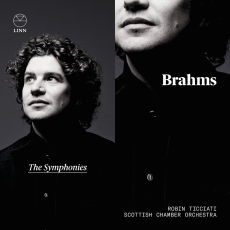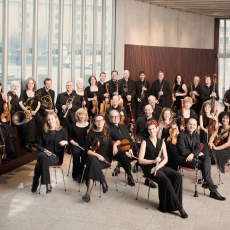Robin Ticciati & SCO - Brahms: The Symphonies - The Herald
MORE or less exactly twenty years on from the 1997 sessions from their acclaimed Telarc label recordings with Sir Charles Mackerras, the SCO was back at the Usher Hall to revisit the four symphonies of Johannes Brahms under the baton of Robin Ticciati – the repeat exercise both a follow-up to the same team’s acclaimed account of Schumann’s symphonies and an acknowledged leave-taking, after Ticciati’s nine years as principal conductor.
The fruits of the new sessions have just been released by Glasgow’s Linn Records and I predict universal praise for the new double set, which has the obvious virtue of being more compact and stylish than the earlier three-disc set, which also included the composer’s Academic Festival Overture and Variations on a Theme by Joseph Haydn. Here is a case where value-for-money “bonus tracks” do not particularly help the continuity of the listening experience (a phenomenon of which collectors of classic jazz reissues will be well aware). In Ticciati’s version, the first two symphonies sit together, as they were composed, Brahms having taken half a composing lifetime to approach the genre and then producing two superb works within a year or so of one another.
Both Mackerras and Ticciati appreciate the importance of having a fleet-footed smaller ensemble to direct, one of the size that Brahms himself knew in the Meiningen court orchestra, and when the earlier recording was made ideas about historically-informed performed were already part of the mainstream and period instruments like small-bore trombones and valve-less horns a familiar sight.
If there is technically not a huge amount separating the recordings, there are also at least half a dozen players who are on both recordings, including trumpeter Peter Franks, bassoonist Alison Green, cellist Su-a Lee and violinists Ruth Crouch and Robert McFall. For all that it is a band of musicians working on freelance contracts, players like those clearly find the SCO a rewarding and conducive place to work.
There are fresh faces in the line-up too, of course, and the presence of current co-leader Benjamin Marquise Gilmore and principal cello Philip Higham can surely take some credit for what is a warmer and fuller string sound on the new recordings, while BBC New Generation Artist and principal horn Alec Frank-Gemmill not only has some beautiful solo moments but leads a section that is on world-class form throughout.
There has been a tendency for faster tempi as conductors took a more rigorous approach to older scores, but things are a little more complex here. Yes, Ticciati is significantly quicker than Mackerras on the fast movements of the first two symphonies, but he is slightly more leisurely on the slower ones, and there is little to choose between the two conductors in terms of pace in the Third and Fourth.
If I had to pick a favourite, – I’d go for the Third, simply because it seems to have my best attention-grabbing moments, like those querulous strings toward the end of the finale, as well as being about no-one but Brahms. As Dr Martin Ennis points out in his fine booklet note, the Fourth sees Brahms already anticipating the composers who would succeed him, which is doubtless why Richard Strauss, who had become assistant conductor with the Meiningen orchestra, like it so much.
Just as Brahms progressed, so too has the SCO, and just as the playing on the Linn recordings has the edge on the earlier ones, so the whole package takes us through the story of Brahms and his relationship with symphonic form in a way that is a real joy. It may prove to be two and half hours of music that is nigh impossible to dip in to, but demands to be consumed in one concentrated sitting. Time will tell on that question, but this I will say: Ticciati may just be at the start of an already much-garlanded career elsewhere, but it would be a shame if these were the last recordings by this partnership.


